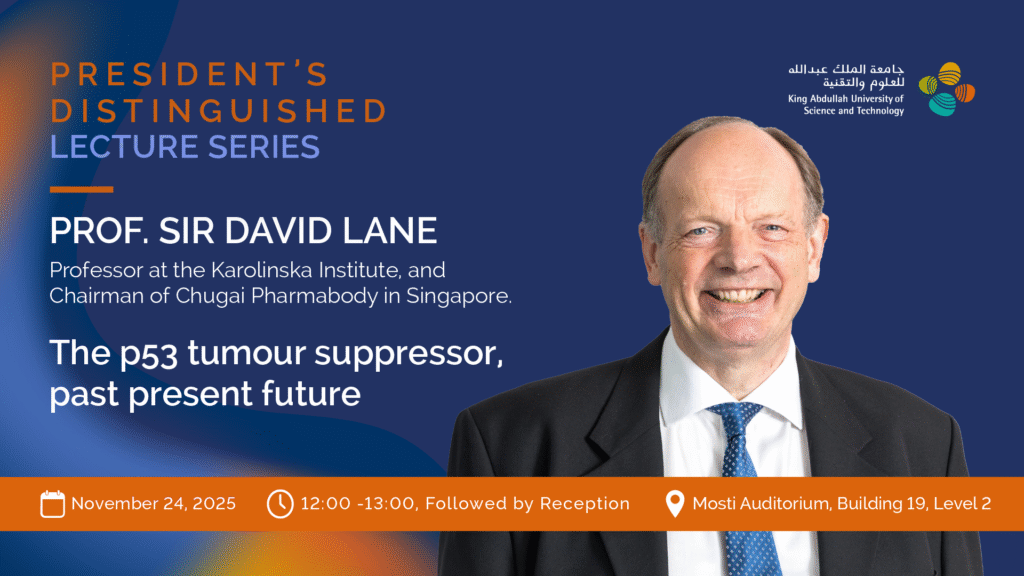
Date: November 24, 2025
Time: 12:00 p.m. to 13:00 p.m.
Location: Mosti Auditorium, Building 19, Level 2
📅 [add to calendar]
Reception to follow the lecture.
KAUST is honored to welcome world-renowned immunologist, molecular biologist, and cancer researcher Professor Sir David Lane, a faculty member at the Karolinska Institute and chairman of Chugai Pharmabody in Singapore, for a Presidential Lecture. He is one of the scientists credited with discovering p53 in 1979 — a tumour-suppressor protein now known as the “Guardian of the genome.”
How does the p53 tumour suppressor gene protect us from cancer?
In his upcoming lecture, “The p53 tumour suppressor, past present future,” Sir David will explore how p53 protects humans from cancer by detecting and destroying damaged cells before they turn dangerous — and how new research and drugs are finding ways to strengthen this powerful defense system.
An impactful protein
Mutations in the TP53 gene — which produces the p53 protein — are common, and humans accumulate cells with alterations in this gene as they age. About half of major human cancers contain mutant TP53. In ovarian cancer, this figure approaches 100 percent. Inheriting a germ-line TP53 mutation causes the devastating Li-Fraumeni cancer-family syndrome, associated with early-onset brain tumours and muscle and connective-tissue cancers (sarcomas).
Further, TP53 is a breast-cancer susceptibility gene, with many Li-Fraumeni patients developing this cancer as young adults. Intensive study of p53 structure and function shows that the protein is highly conserved and tightly regulated. Cancer-resistant species such as bats, blind mole rats, naked mole rats, and elephants all exhibit enhanced p53 activity.
The p53 pathway is activated by diverse stress signals and operates through accumulation of the p53 protein via reduced degradation and increased activation of its role as a transcription factor, driving expression of DNA-repair, cell-cycle-inhibitor, and apoptosis-inducing genes. The pathway’s complexity is immense, and a complete scientific consensus on how p53 protects humans from cancer has not yet been reached.
Nevertheless, promising new drugs that target the pathway are showing clinical efficacy. The p53 story illustrates how science progresses through continual questioning of what is known.
About the speaker
Prior to his current position, Sir David was chief scientist of the Agency for Science, Technology and Research (A*STAR) in Singapore (2009–2021) and chairman of A*STAR’s Institute of Molecular and Cell Biology (IMCB) scientific advisory board (2002–2003).
He served as IMCB’s executive director (2004 to 2007), contributing to the institute’s translational focus, strengthening core research and development capabilities, recruiting leading scientists, and advancing collaboration.
In 2006, he became the founding CEO of A*STAR’s Experimental Therapeutics Centre, establishing a robust team of more than 60 scientists and building top-tier technological platforms essential for drug discovery. An honorary citizen of Singapore, Sir David has chaired Chugai Pharmabody since its establishment in Singapore in 2012.
He previously served as director of the Cancer Research UK Cell Transformation Research Group and as professor of oncology at the University of Dundee in Scotland. In 1996, he founded Cyclacel Pharmaceuticals, acting as director and chief science officer until the company joined NASDAQ.
Sir David was also Cancer Research UK’s first chief scientist and was scientific director of the Ludwig Institute. For his contributions to cancer research, Queen Elizabeth II knighted him in the New Year Honours list in January 2000. His awards include the Paul Ehrlich Prize (1998), the Buchanan Medal (2004), the International Agency for Research on Cancer Medal of Honor (2005), and the Royal Medal of the Royal Society of Edinburgh (2008).
He is a member of the European Molecular Biology Organisation, a Fellow of the Royal Society and the Royal Society of Edinburgh, and a founder member of the Academy of Medical Sciences. Sir David is a foreign member of the U.S. National Academy of Sciences and holds honorary degrees from several U.K. and European universities.
Join us for this unforgettable event.
KAUST President Sir Edward Byrne AC FMedSci

